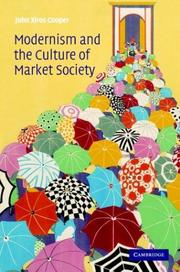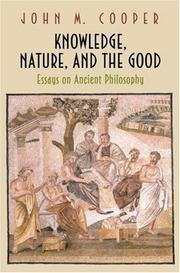| Listing 1 - 5 of 5 |
Sort by
|

ISBN: 9780521834865 0521834864 9780511485374 9780521120111 0511227582 9780511227585 0511231679 9780511231674 0511229283 9780511229282 0511230125 9780511230127 0511230907 9780511230905 0511485379 1280703083 9781280703089 1107161134 9781107161139 0511316801 9780511316807 052112011X Year: 2004 Publisher: Cambridge, UK New York Cambridge University Press
Abstract | Keywords | Export | Availability | Bookmark
 Loading...
Loading...Choose an application
- Reference Manager
- EndNote
- RefWorks (Direct export to RefWorks)
Many critics argue that the modernist avant-garde were always in opposition to the commercial values of market-driven society. For John Xiros Cooper, the avant-garde bears a more complex relation to capitalist culture than previously acknowledged. He argues that in their personal relationships, gender roles and sexual contacts, the modernist avant-garde epitomised the impact of capitalism on everyday life. Cooper shows how the new social, cultural and economic practices aimed to defend cultural values in a commercial age, but, in this task, modernism became the subject of a profound historical irony. Its own characterising techniques, styles and experiments, deployed to resist the new nihilism of the capitalist market, eventually became the preferred cultural style of the very market culture which the first modernists opposed. In this broad-ranging 2004 study John Xiros Cooper explores this provocative theme across a wide range of Modernist authors, including Joyce, Eliot, Stein and Barnes.
English literature --- Thematology --- anno 1900-1999 --- Modernism (Literature) --- Capitalism and literature --- American literature --- Avant-garde (Aesthetics) --- Consumption (Economics) in literature. --- Economics in literature. --- Aesthetics --- Modernism (Art) --- Literature and capitalism --- Literature --- History and criticism. --- History --- Arts and Humanities --- LITTERATURE ANGLAISE --- MODERNISME (LITTERATURE) --- CAPITALISME ET LITTERATURE --- LITTERATURE AMERICAINE --- AVANT-GARDE (ESTHETIQUE) --- CONSOMMATION (ECONOMIE POLITIQUE) DANS LA LITTERATURE --- ECONOMIE POLITIQUE DANS LA LITTERATURE --- 20E SIECLE --- HISTOIRE ET CRITIQUE --- GRANDE-BRETAGNE --- ETATS-UNIS

ISBN: 0691117241 0691117233 9786612087080 1282087088 1400826446 9781400826445 9780691117232 9780691117249 9781282087088 Year: 2004 Publisher: Princeton, N.J. Princeton University Press
Abstract | Keywords | Export | Availability | Bookmark
 Loading...
Loading...Choose an application
- Reference Manager
- EndNote
- RefWorks (Direct export to RefWorks)
Knowledge, Nature, and the Good brings together some of John Cooper's most important works on ancient philosophy. In thirteen chapters that represent an ideal companion to the author's influential Reason and Emotion, Cooper addresses a wide range of topics and periods--from Hippocratic medical theory and Plato's epistemology and moral philosophy, to Aristotle's physics and metaphysics, academic scepticism, and the cosmology, moral psychology, and ethical theory of the ancient Stoics. Almost half of the pieces appear here for the first time or are presented in newly expanded, extensively revised versions. Many stand at the cutting edge of research into ancient ethics and moral psychology. Other chapters, dating from as far back as 1970, are classics of philosophical scholarship on antiquity that continue to play a prominent role in current teaching and scholarship in the field. All of the chapters are distinctive for the way that, whatever the particular topic being pursued, they attempt to understand the ancient philosophers' views in philosophical terms drawn from the ancient philosophical tradition itself (rather than from contemporary philosophy). Through engaging creatively and philosophically with the ancient texts, these essays aim to make ancient philosophical perspectives freshly available to contemporary philosophers and philosophy students, in all their fascinating inventiveness, originality, and deep philosophical merit. This book will be treasured by philosophers, classicists, students of philosophy and classics, those in other disciplines with an interest in ancient philosophy, and anyone who seeks to understand philosophy in philosophical terms.
Ancient philosophy --- Antieke filosofie --- Filosofie [Antieke ] --- Filosofie [Griekse ] --- Filosofie [Romeinse ] --- Filosofie van de Oudheid --- Greek philosophy --- Griekse filosofie --- Philosophie ancienne --- Philosophie antique --- Philosophie de l'Antiquité --- Philosophie grecque --- Philosophie romaine --- Philosophy [Ancient ] --- Philosophy [Greek ] --- Philosophy [Roman ] --- Roman philosophy --- Romeinse filosofie --- Philosophy, Ancient. --- Knowledge, Theory of --- Naturalism --- Good and evil --- Théorie de la connaissance --- Naturalisme --- Bien et mal --- #GGSB: Filosofie --- #GGSB: Filosofie (oudheid) --- Théorie de la connaissance --- Philosophy, Greek --- Philosophy, Roman --- Philosophy, Ancient --- Filosofie --- Filosofie (oudheid) --- Academic skepticism. --- Alexander Nehamas. --- Alexander of Aphrodisias. --- Analogy. --- Antiochus of Ascalon. --- Aristotle. --- Arius Didymus. --- Atomism. --- Awareness. --- Cambridge University Press. --- Carneades. --- Chrysippus. --- Concept. --- Counterargument. --- Criticism. --- Democritus. --- Determinism. --- Dialectician. --- Disease. --- Empedocles. --- Epictetus. --- Epicureanism. --- Epicurus. --- Epistemology. --- Ethics. --- Eudaimonia. --- Existence. --- Explanation. --- Explication. --- Eye color. --- Feeling. --- First principle. --- Four causes. --- Glaucon. --- God. --- Good and evil. --- Hedonism. --- Hiero (Xenophon). --- Hypothesis. --- Illustration. --- Immanuel Kant. --- Indication (medicine). --- Inference. --- Ingredient. --- Inquiry. --- Isocrates. --- Lecture. --- Loeb Classical Library. --- Materialism. --- Methodology. --- Morality. --- Mutatis mutandis. --- Natural kind. --- On Ancient Medicine. --- Ontology. --- Parmenides. --- Phenomenon. --- Philosopher. --- Philosophical analysis. --- Philosophical methodology. --- Philosophical theory. --- Philosophy. --- Physician. --- Plato. --- Platonism. --- Potentiality and actuality. --- Practical reason. --- Pre-Socratic philosophy. --- Premise. --- Principle. --- Protagoras. --- Pyrrhonism. --- Quantity. --- Rationality. --- Reality. --- Reason. --- Requirement. --- Rhetoric. --- Self-sufficiency. --- Semen. --- Sextus Empiricus. --- Skepticism. --- Socratic method. --- Socratic. --- Stoicism. --- Suggestion. --- Teleology. --- The Philosopher. --- Theaetetus (dialogue). --- Theoretical physics. --- Theory of Forms. --- Theory. --- Thought. --- Treatise. --- Uncertainty. --- Understanding. --- Value theory. --- Virtue. --- W. D. Ross. --- Writing.
Book
ISBN: 9780521496292 Year: 2004 Publisher: Cambridge Cambridge University Press
Abstract | Keywords | Export | Availability | Bookmark
 Loading...
Loading...Choose an application
- Reference Manager
- EndNote
- RefWorks (Direct export to RefWorks)
Book
Year: 2004 Publisher: Project Gutenberg
Abstract | Keywords | Export | Availability | Bookmark
 Loading...
Loading...Choose an application
- Reference Manager
- EndNote
- RefWorks (Direct export to RefWorks)
Book
Year: 2004 Publisher: Project Gutenberg
Abstract | Keywords | Export | Availability | Bookmark
 Loading...
Loading...Choose an application
- Reference Manager
- EndNote
- RefWorks (Direct export to RefWorks)
| Listing 1 - 5 of 5 |
Sort by
|

 Search
Search Feedback
Feedback About UniCat
About UniCat  Help
Help News
News